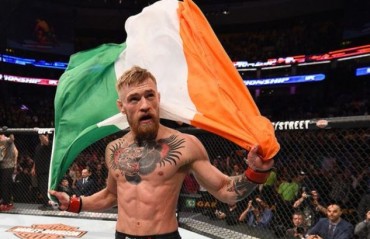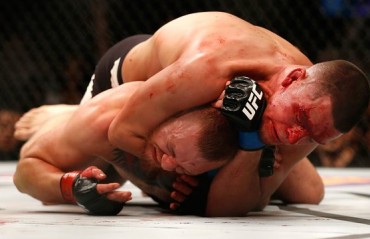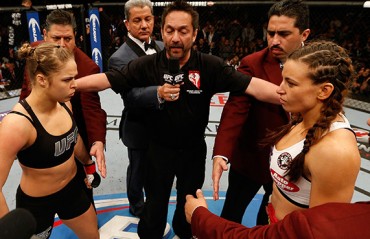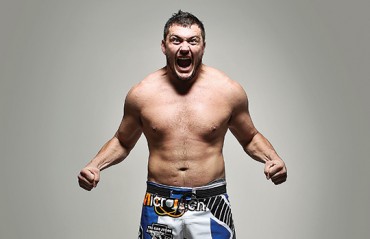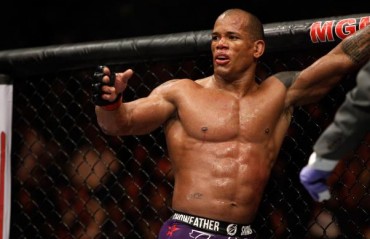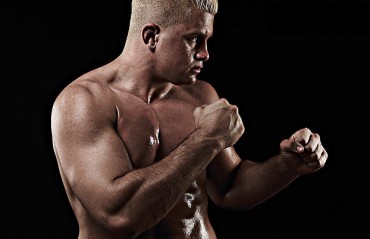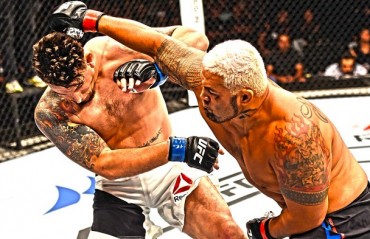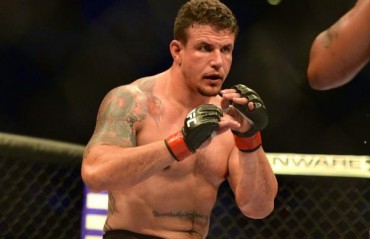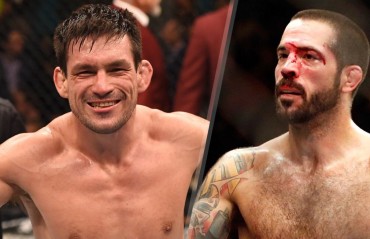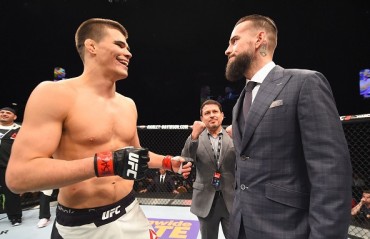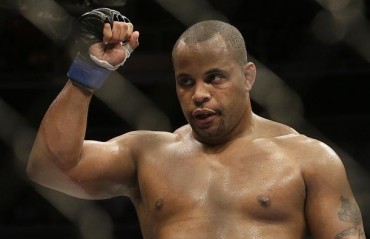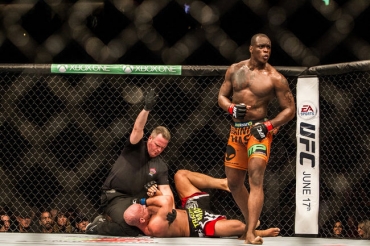#TFGInterview - Siddharth Singh on Anshul Jubli's 'Road to UFC' fight, running Crosstrain gym and competing in Jiu Jiutsu
- By Chiranjit Ojha

- May 31, 2022
WHEN THE UFC picked Indian fighters for its 'Road to UFC' Lightweight tournament, it was something of a watershed moment for Indian MMA.
Not just because two of the top names in the Indian circuit had just received recognition from the world's leading MMA promotion, but they were home grown talents in the truest sense.
Both Anshul Jubli (5-0) and Pawan Singh Maan (7-2-1) train primarily out of India. They have been competing in Matrix Fight Night, a decidedly Indian MMA promotion, where they faced mostly Indian opponents.
From that stage in their career, they are stepping up to 'Road to UFC.' And it seems like a step-up for not just them, but also Indian MMA as a whole.
Siddharth Singh, a man who has been intrinsically involved with Indian MMA for a decade, knows what's at stake and what it will take to make the most of it,
"I was speaking to Somesh Kamra, he was mentioning that the plan is to have 2-3 fighters. I think Roshan Singh Mainam will carry over to next year, Anshul and Pawan are in. But more than them fighting in Road to UFC, if one of them can win, that's going to take things to the next level... people have fought before and lost, it has had zero impact on the community. But if an Indian can win, then that'll open the floodgates both in terms of popularity and in terms of fighters having that confidence in their ability."
Siddharth is himself an elite Jiu Jiutsu competitor, who caused a stir last year when he won the silver medal at the Jiu-Jitsu Championship 2021 (Brown Belt, 77 kg, Masters Division). He has personal stakes in the 'Road to UFC' experiment as well, as Anshul Jubli's head coach and chief cornerman.
Anshul Jubli joined Crosstrain Fight Club, Siddharth's Delhi-based chain of fitness and MMA centres, back in 2018. He has since made his pro MMA debut and won 5 fights in a row, including the distinction of becoming the second ever Indian fighter in MFN history to beat a foreigner.
But Siddharth has no illusion about how difficult the task will be for Anshul to take on Sho Patrick Usami (4-1) on 10th June,
"Competing in India and competing abroad are two different levels altogether. Like, it's not even in the same ballpark. When I compete in Jiu Jiutsu abroad, a lot of the times the struggle is just to survive... when I'm training, I'm a brown belt, and all my partners are my students. White belts, blue belts, purple belts. I'm competing with brown belts who roll with 30-40 black belts on a weekly basis. I can count the number of black belts I have trained with in my whole life. So there's a complete disparity. So we cannot compare competing in India and competing abroad... I always suggest to people, compete as much as you can in India, at the amatuer level, lose in the amateurs, no one cares. Once we move onto the pro league then we can't make mistakes. Outside they are all sharks, all high level. We gradually build up to that... it has to be gradual, otherwise you're feeding a lamb to the wolves."
But what drives his confidence in his star pupil, he says, is Anshul's willingness to make sacrifices to to earn results,
"He's special. He has dedicated his life to this. He does nothing else. He's in the gym twice a day. He's putting in 5-6 hours every day. He's living and breathing it, studying fights all day... it's taken him four and a half years including the lockdown to break through to the UFC... and he has had five fights, and 12-13 amateur fights before that."
That's one parallel that can be easily drawn in the journeys of Anshul and Siddharth: an undivided dedication to the work at hand,
"I'm coaching, I'm training, I'm teaching and I'm competing at the same time. I have to corner my students and run a business as well.. it's a balance of all those things. That's what being 100% committed means. I cannot do anything else. I'm not doing anything else. I'm a 100% focused on this."
Siddharth's intiitation into combat sports happened when he was a student at Doon School. Although he preferrd playing team sports, he was practically made to sign up for boxing competitions by virtue of his brother being a boxer as well,
"I found the whole thing to be pretty scary but I also found it to be difficult. If a team lost, a team lost. Nobody could say, you lost... but boxing is an individual sport. That's a scary thing, when you're about to go in for a boxing bout in front of the entire school, that was scary. When you lose, and I lost a lot, that was a humbling experience. You think you trained, you're ready, and then the guy beats you. And no matter how much you trained, nobody cares. You know, you lost."
He lost the school competition for 5 years in a row. Then, in 12th standard, he went all out to win for once. He trained all year, and won his weight class. He was also awarded as the best boxer in the school.
That experience of overcoming repeated losses did something else to him. It gave him an insatiable urge to train and improve through competition,
"The win didn't do anything for me. I wanted to train more, I wanted to compete."
After school he moved to the United Kingdom, where he went looking for a boxing club to join. But the closest club he could find to his residence was a 'Thai Boxing' club. This became, for him, a somewhat unintentional introduction to Muay Thai, a sport where he would go on to earn the distinction of a 'Master',
"It said Thai Boxing. So I thought, okay, how different can it be?... When I went there I figured out, oh, this is Muay Thai. So you've got punching, kicking, elbowing, kneeing... And I really loved kicking. I enjoyed it a lot."
At the same gym, he was later introduced to Jiu Jiutsu through a seminar,
"Initially, Jiu Jiutsu looked really weird. It was just a couple of people rolling around on the ground. And I had been a striker... I didn't want to get into it right away but I realised that punching, kicking is really good if the person is a feet or two away from you but as soon as they grab hold of you, they bear hug you or grab you from the back, all of a sudden punching and kicking goes out of the window. And if they throw you on the ground, you're completely useless. You have no idea what to do. That's when I started to appreciate Jiu Jiutsu... the whole concept of it was that a smaller person can beat a larger opponent using technique and skill. That excited me because I'm not a big guy, I'm 72 kilos. And I'm constantly training with people who are 90 kilos or 100 kilos. Much bigger than me."
In time, Jiu Jiutsu would go on to became his primary sport of choice to compete in. And the trifecta of Boxing, Muay Thai and Jiu Jiutsu would also open the doors for him into a new, emerging sport called Mixed Martial Arts.
It would be MMA that would go on to be the cornerstone sport for his fight club,
"Back then, nobody in India, or in Delhi at least, was doing MMA training right. Every time I visited Delhi I had a hard time finding a good place to train. That's what gave me the idea to start Crosstrain."
So he quit his corporate job in England, returned to India and set up his dream vocation: running an MMA-centric combat sports training centre that also provided regular fitness and gym services. But the problem was, very few people in India had heard of or understood MMA at that point,
"When you put yourself in a martial arts category, they didn't see Muay Thai, Jiu Jiutsu any differently from Tae Kwon Do, Karate... We would charge 3000 rupees a month for Boxing, Muay Thai, Wrestling, Jiu Jiutsu and people would say, why should we pay you 3000 when somebody's teaching us Tae Kwon Do for 300 rupees? People didn't know what these martial arts were and what was their efficacy in real life situations... I have been training in Jiu Jiutsu for 10 years and I'm stil not a black belt. So what would I tell them?... I'd say it's going to take you over 10 years. And that was a dealbreaker because they had a cousin who was 8 years old and had a black belt in Karate... if UFC was already on TV we could tell them to go watch it on Sony but that wasn't the case. Our only option was to tell them to go watch Never Back Down and hopefully they would like it."
But once UFC started being regularly televised, and popular fighters like Ronda Rousey and Conor McGregor captured the popular imagination, things slowly began to change,
"The type of queries we would get started to change. Initially we would get questions like I want to become a Ninja in 3 months. But then it was like, how long before I get to the UFC... when can I become a professional fighter. What I tell them is, fact of the matter is it's going to take more than a year easily. If you train with us regularly, which is 5-6 days a week regularly, twice a day, for one year, then maybe you can become a competent amateur MMA fighter in the Indian scene... I'm not saying someone can become a champion of the amateur scene in one year. But you can become competent and go 1-0, 2-0, 3-0 if you are really dedicated to the training."
The domestic MMA scene also began to develop with SFL doing occasional shows and Jiu Jiutsu competitions starting to pop up. By 2014, Crosstrain also started to develop its own core group of passionate Jiu Jiutsu practitioners, and things finally began to take shape,
"They actually fell in love with training rather than watching the sport. So there was a doers' mindset. They didn't know who Dominic Cruz was or Frank Mir was. But they knew what an armbar was or what a triangle was... those guys stuck on and eventually they got blue belts. So when the new crew came in they had a coloured belt to roll with. Then all of a sudden they realised, oh, there's some technique involved. They're smaller than me but they're damn good. They could see there's levels to the game, so if they stuck on they would get to those higher levels."
For Siddharth, too, it was a big turning point; he had become a Brown Belt in Jiu Jiutsu and was competing in the Masters Division. His success on the mat in Abu Dhabi began to change the perspective of his students about their own abilities,
"Intially people would say, you'll get killed. Oh, you're fighting a Russian? Make sure you don't break your hand. They'll break your leg, they do Sambo. So those are things I would hear when I went out to compete abroad. But when I started winning, then the conversation was oh damn, you beat a Russian?... The whole morale changed. They thought, maybe we can beat those guys. Maybe we are competetive with other countries at that level. All those factors played into it, confidence came in students and the community."
Siddharth, however, was not surprised by the rising popularity of MMA and its chief underlying martial arts in India,
"I had expected it to grow much faster. When Dana White said in 2008 or 2009 that he'll come to India, I thought by 2015-16 it would blow up, the sport would be massive. It wasn't the case. In fact 2016 was when the sport started to grow, it barely started to move. It's now that people are more familiar with MMA. So it's taken 5 extra years, but I still think than in the next 10 to 15 years is when the sport will start hitting its stride... I think the more people start watching it they'll grow into it. They'll start to see the technical side of it. They'll see the fun that one can have while watching it."
What undermined this growth, though, was the COVID-19 pandemic. The social distancing requirements made it almost impossible to run a gym. And Siddharth himself went through a bad case of the disease where he had to be hospitalized.
At the same time, he was preparing for the the Jiu Jiutsu championship in Abu Dhabi, which made things particularly difficult,
"It was just before the second wave... me and my student Tarun, the two of us went. We only had four or five training partners. So what you do is you do a thing called shark tank where I would stay in and we'd have six students. I would stay in and I'd get a new opponent every round while they are fresh. So they're going 100% on me for 3 minutes. After it's over they get to go back and rest, but next guy comes in and I get no rest... that's sort of how I managed to work around those issues... it's a disadvantage I have to deal with all the time. I'm lucky if I get to train with a blue belt, but my opponents are always training with black belts."
Nonetheless, the year 2021 brought about the landmark in his career he was hoping for. After narrowly missing out on the podium twice, he was able to secure a silver medal at Abu Dhabi.
Back home, too, he designed new ways to bring Crosstrain back on its feet despite the pandemic; which included an unusual 'socially distant MMA training program' called Crosstrain30,
"It's a 30 minute workout where we have 9 stations. All these circuits are far from each other and each station is a workout for a different muscle group. For example, one station can be skipping. So you go in, there's a 3 minute session of skipping. Then the buzzer rings, you go to the next station which is shadow boxing. Then next station, punching the bag. Next station, only kicks on the bag. So it was a good 30 minute workout where you're not touching anybody but still getting a full body workout... and you're safe from any virus. It was so successful we're still doing it. Half our gym is segregated as Crosstrain 30... right now it's double vaccination required plus temperature checks for whoever is coming in... if you have a temperature, you're not allowed to train. Go get a COVID test, come back with a negative report and you can train."
The Crosstrain Fight Club centres are also diversifying with different gyms focusing on different groups of people,
"Our main centre is in Saket. That's the fight HQ. That's where all the fighters go. We've got another centre in Vikas Palli which is West Delhi, and Noida also. But those are more like how we were. People come in, you have an office job, you wanna learn technique, you wanna have fun, those are the centres you go to. If you want to become a professional fighter, we send them to the Saket centre... young hungry 18 years olds who train 5 year a day should not be sparring with 38 year old office goers who train twice a week."
At the same time, Siddharth is gearing up for his next major Jiu Jiutsu competition in September. This time, he wants to train in Brazil for a few weeks in order to be better prepared. The challenge in this remains in the need to schedule his own training in a way that it does not interfere with his students' training.
Although he stresses on the need for martial artists and MMA fighters to train abroad, he also points out that it can be a mixed bag experience,
"The training abroad you get is much higher in quality. But it again depends on the financial situation. A lot of people can't afford that. So if you have the financial resources, and you can, definitely go out and train. But the flip side of that is in the really big academies or gyms, you're really one amongst 300 fighters that they have. How much are they actually going to invest in you? Compare that to Indian academies where they may have 100 students but out of the maybe just 5 are really good pro level guys. So the coach knows the pro guys and he can spend a lot more time honing their skills, focusing on them, studying for them... and then again there is a level of comfort you have in India, because it's home. So there's pros and cons to both... I'd say you'll have to go train abroad at some point for some time at least, just to get a difference of coaching styles and different partners. I do that as well. I haven't done that recently but I used to go out and stay in the UK for a few weeks just so I get to train with potentially the same level of opponents I'm going to face. So I always encourage. Like with Anshul and Punyajit also, you'd always send them for a couple of weeks to Thailand, train for a bit, come back and then compete."
For now, however, the first thing on his mind remains Anshul Jubli's upcoming fight,
"First Anshul needs to get past this fight. First Anshul needs to gets past his opponent who is an absolute killer. He knocks out everybody. I'm surprised he has not already fought in UFC... so hopefully we can put up a good show against this guy and then we can fight again, September or October, whenever it is."
For Siddharth himself, this massive juggling act of a career where he runs a gym, coaches and competes at the same time, is something he wants to continue for years to come. And the first priority, he isnsists, will always be his students' training, not his own,
"If we have a time when my guys aren't fighting, that's when I am competing. Before this I used to travel and compete all year long. But now, for me, the up and coming guys take precedence... for example if I had never come back to India, if I had stayed in the UK, had not not spent time teaching the guys and growing the sport here, yeah I would have become a black belt a while ago. I'd have been 100% focused on my own training... I'd be a much better grappler with much better skill. Of course. But then again, I might have been a really good black belt, but would Anshul Jubli have been in the UFC? Would we have so many pro MMA fighters fighting from Delhi? A lot of them would not have been pro MMA fighters if not for Crosstrain."
Get the latest in the world of Sports, Teams, and Players! Free Delivery to your Inbox.









